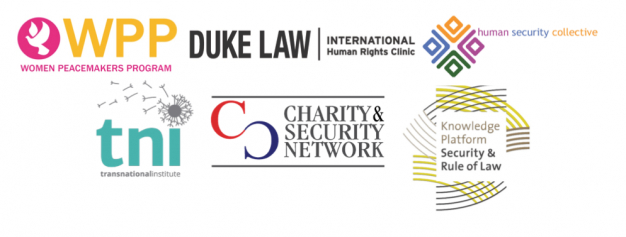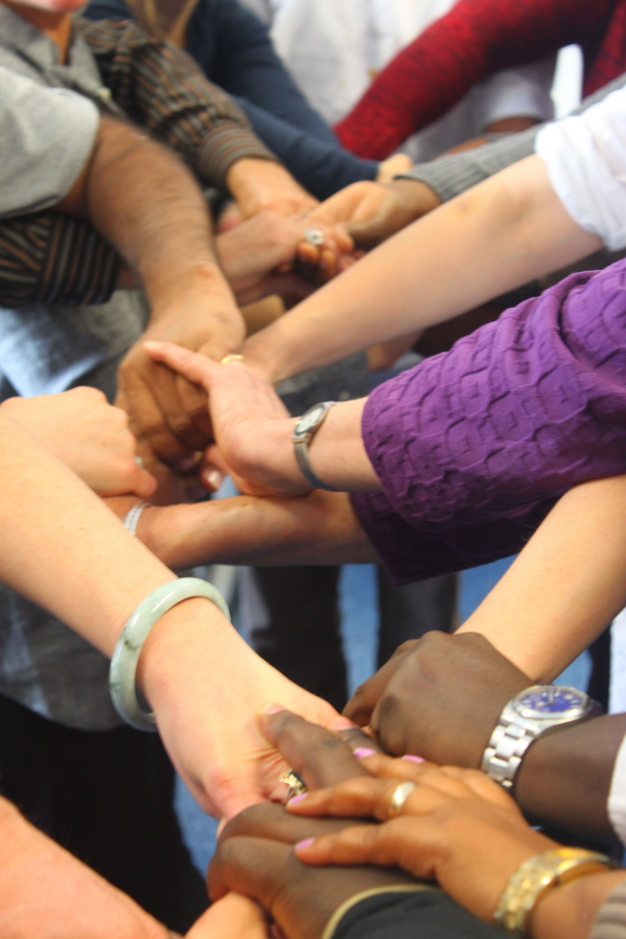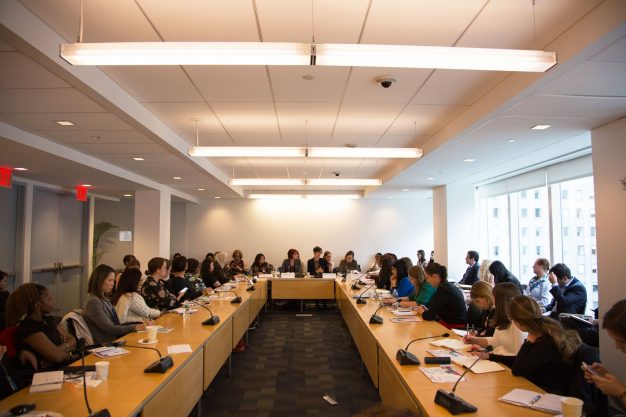It is our pleasure to present to you the 'Candid Voices' video series: 10 personal stories from women and men from around the world who work on gender-sensitive peacebuilding within their own communities. In run-up to the 15th anniversary of UNSCR 1325 in October, we will be releasing one video every week. You can find them on our website, Facebook and Twitter page.
These stories are part of the joint action research project ‘Candid Voices from the Field: Obstacles to Delivering Transformative Change within the Women, Peace and Security Agenda’, coordinated by the Women Peacemakers Program (WPP), the Global Partnership for the Prevention of Armed Conflict (GPPAC), and Cordaid. The aim is to uncover the deep-rooted issues that hamper women’s participation in peace efforts. Those interviewed participated in a global consultation meeting for the project that took place in The Hague from June 30 to July 2, 2015. The publication of our findings will be launched on October 23, 2015 in New York, coinciding with the anniversary of UNSCR 1325.
 Fatima Outaleb gives a moving account of her personal journey into the field of gender and peacebuilding. As a woman activist, she shows us a glimpse of the deep commitment she and others like her have shown in their work for peace and gender justice. She connects the personal to the political by linking her own experiences to the wider obstacles to the implementation of the Women, Peace and Security agenda.
Fatima Outaleb gives a moving account of her personal journey into the field of gender and peacebuilding. As a woman activist, she shows us a glimpse of the deep commitment she and others like her have shown in their work for peace and gender justice. She connects the personal to the political by linking her own experiences to the wider obstacles to the implementation of the Women, Peace and Security agenda.
Click here to see the first video.
 Looking back to the disappearance of her son, a Sri Lankan military officer who was reported Missing in Action, Visaka Dharmadasa talks about how it shaped her drive to work for peace in her country. She speaks on the role of women peacemakers in situations of conflict and what will happen if the world adopts women’s definition of security.
Looking back to the disappearance of her son, a Sri Lankan military officer who was reported Missing in Action, Visaka Dharmadasa talks about how it shaped her drive to work for peace in her country. She speaks on the role of women peacemakers in situations of conflict and what will happen if the world adopts women’s definition of security.
Click here to see the second video
 Reflecting on her origins in the women’s movement in Belfast, Northern Ireland, Karen McMinn discusses what this has taught her about women’s capacity to build bridges during conflict. She examines the main obstacles for women’s participation in decision-making processes and discusses the way forward. Karen McMinn is the Research Consultant on the action research ‘Candid Voices from the Field’, coordinated by the Women Peacemakers Program (WPP), the Global Partnership for the Prevention of Armed Conflict (GPPAC), and Cordaid.
Reflecting on her origins in the women’s movement in Belfast, Northern Ireland, Karen McMinn discusses what this has taught her about women’s capacity to build bridges during conflict. She examines the main obstacles for women’s participation in decision-making processes and discusses the way forward. Karen McMinn is the Research Consultant on the action research ‘Candid Voices from the Field’, coordinated by the Women Peacemakers Program (WPP), the Global Partnership for the Prevention of Armed Conflict (GPPAC), and Cordaid.
Click here to see the third video
 In order to create sustainable peace, the discourse on security must be changed from the ‘power over’ to the ‘power with’ model, argues Anthony Keedi. He examines the current violent, patriarchal ways of dealing with conflict and argues for a better way forward that addresses the root causes of violence.
In order to create sustainable peace, the discourse on security must be changed from the ‘power over’ to the ‘power with’ model, argues Anthony Keedi. He examines the current violent, patriarchal ways of dealing with conflict and argues for a better way forward that addresses the root causes of violence.
Click here to see the fourth video
 Netsai Mushonga speaks on active nonviolence as an element of women’s activism for peace in this powerful video. She argues for a definition of peace that is not restricted to the absence of war, but also includes the elimination of militarization and violence in all levels of society.
Netsai Mushonga speaks on active nonviolence as an element of women’s activism for peace in this powerful video. She argues for a definition of peace that is not restricted to the absence of war, but also includes the elimination of militarization and violence in all levels of society.
Click here to see the fifth video
 Reflecting on the roots of her own activism, Sophie Toupin talks about media as a tool for development, empowerment and self-organization. She also looks at the importance of “the collective” in achieving social change, especially with regards to implementing the Women, Peace and Security agenda.
Reflecting on the roots of her own activism, Sophie Toupin talks about media as a tool for development, empowerment and self-organization. She also looks at the importance of “the collective” in achieving social change, especially with regards to implementing the Women, Peace and Security agenda.
Click here to see the sixth video
 Thinking back on his first experiences with discrimination, Anand Pawar discusses the importance of applying feminist values in analyzing and dealing with injustices. When it comes to conflict, he says, feminist organizing and the adherence to principles of participation, justice, and nonviolence are more empowering to all involved.
Thinking back on his first experiences with discrimination, Anand Pawar discusses the importance of applying feminist values in analyzing and dealing with injustices. When it comes to conflict, he says, feminist organizing and the adherence to principles of participation, justice, and nonviolence are more empowering to all involved.
Click here to see the seventh video
 Jasmin Nario-Galace recounts how her childhood experiences with bullying and discrimination have fed her passion for peace and tolerance education. She emphasizes the importance of education for men and women as a tool to create and promote a culture of peace.
Jasmin Nario-Galace recounts how her childhood experiences with bullying and discrimination have fed her passion for peace and tolerance education. She emphasizes the importance of education for men and women as a tool to create and promote a culture of peace.
Click here to see the eighth video
 Relating UNSCR 1325 implementation to the Iraqi context, Suzan Aref emphasizes the urgent need for policies that cater to the needs of women locally. For her, this means that the implementation addresses long-term strategies for peace as well as provides immediate support for women on the ground.
Relating UNSCR 1325 implementation to the Iraqi context, Suzan Aref emphasizes the urgent need for policies that cater to the needs of women locally. For her, this means that the implementation addresses long-term strategies for peace as well as provides immediate support for women on the ground.
Click here to see the ninth video
 Reflecting on the assassination of her friend, Hajer Sharief reveals the deeply personal nature of her peace activism. Looking beyond the role of women civil society organisations in the implementation of UNSCR 1325, she also discusses the importance of the inclusion of women at the political level and diplomatic level in Libya.
Reflecting on the assassination of her friend, Hajer Sharief reveals the deeply personal nature of her peace activism. Looking beyond the role of women civil society organisations in the implementation of UNSCR 1325, she also discusses the importance of the inclusion of women at the political level and diplomatic level in Libya.
12 Dec '17 Today, we are pleased to share with you the Conference Report “Financial Inclusion for Freedom and Security” by the Women Peacemakers Program, Duke Law International Human Rights Clinic, Human Security Collective, Transnational Institute, the Charity & Security Network, in cooperation with the Knowledge Platform Security and Rule of Law.

7 Dec '17 Today, on the 13th day of the 16 Days of Activism Against Gender Violence Campaign, we bring you the sad news that from 15 December onwards, the Women Peacemakers Program (WPP) will have to close its doors. We would like to ask for your time to read what has driven us to make this decision.

7 Nov '17 On Thursday, 26 October 2017, a side event entitled, “Pulling the Rug from Under Our Feet: What is the UNSCR 1325 Without Civil Society Freedoms?” was hosted on the margins of the 17th anniversary of United Nations Security Council Resolution (UNSCR) 1325. The event was hosted by the Women Peacemakers Program (WPP) and the Dutch Mission, in collaboration with Duke Law’s International Human Rights Clinic, Al-Hayat Center for Civil Society Development, Arab Women Organisation of Jordan, NOVACT, Free Sight Association, Iraqi Al-Amal Association, Women Empowerment Organisation, NGO Working Group on Women, Peace and Security and Women’s International League for Peace and Freedom. This article briefly looks at the main issues discussed during the event.
